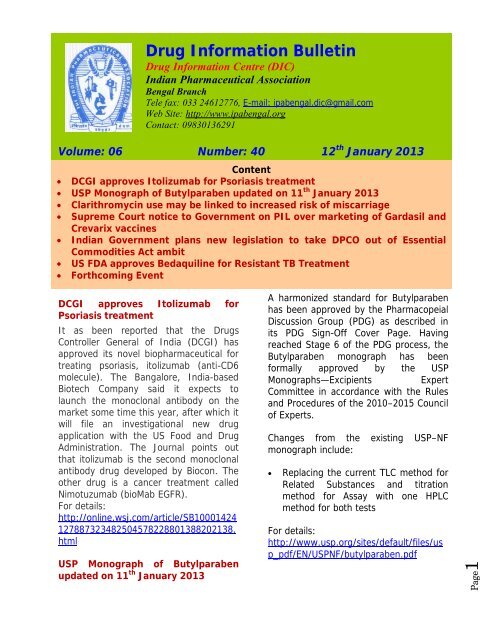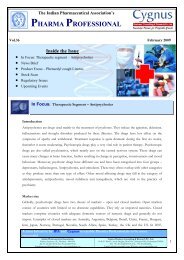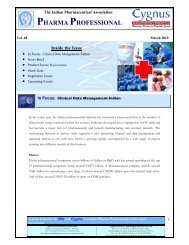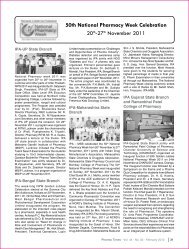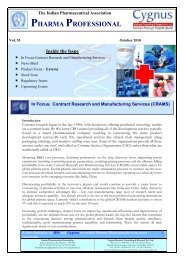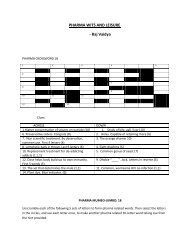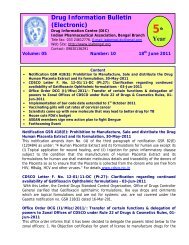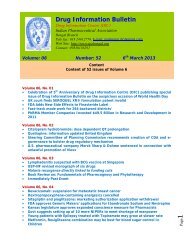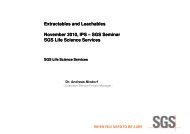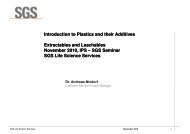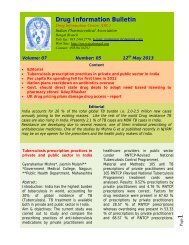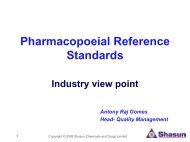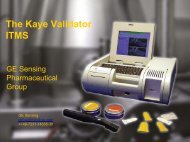Number 40 - Indian Pharmaceutical Association
Number 40 - Indian Pharmaceutical Association
Number 40 - Indian Pharmaceutical Association
You also want an ePaper? Increase the reach of your titles
YUMPU automatically turns print PDFs into web optimized ePapers that Google loves.
Drug Information Bulletin<br />
Drug Information Centre (DIC)<br />
<strong>Indian</strong> <strong>Pharmaceutical</strong> <strong>Association</strong><br />
Bengal Branch<br />
Tele fax: 033 24612776, E-mail: ipabengal.dic@gmail.com<br />
Web Site: http://www.ipabengal.org<br />
Contact: 09830136291<br />
Volume: 06 <strong>Number</strong>: <strong>40</strong> 12 th January 2013<br />
Content<br />
• DCGI approves Itolizumab for Psoriasis treatment<br />
• USP Monograph of Butylparaben updated on 11 th January 2013<br />
• Clarithromycin use may be linked to increased risk of miscarriage<br />
• Supreme Court notice to Government on PIL over marketing of Gardasil and<br />
Crevarix vaccines<br />
• <strong>Indian</strong> Government plans new legislation to take DPCO out of Essential<br />
Commodities Act ambit<br />
• US FDA approves Bedaquiline for Resistant TB Treatment<br />
• Forthcoming Event<br />
DCGI approves Itolizumab for<br />
Psoriasis treatment<br />
It as been reported that the Drugs<br />
Controller General of India (DCGI) has<br />
approved its novel biopharmaceutical for<br />
treating psoriasis, itolizumab (anti-CD6<br />
molecule). The Bangalore, India-based<br />
Biotech Company said it expects to<br />
launch the monoclonal antibody on the<br />
market some time this year, after which it<br />
will file an investigational new drug<br />
application with the US Food and Drug<br />
Administration. The Journal points out<br />
that itolizumab is the second monoclonal<br />
antibody drug developed by Biocon. The<br />
other drug is a cancer treatment called<br />
Nimotuzumab (bioMab EGFR).<br />
For details:<br />
http://online.wsj.com/article/SB10001424<br />
127887323482504578228801388202138.<br />
html<br />
USP Monograph of Butylparaben<br />
updated on 11 th January 2013<br />
A harmonized standard for Butylparaben<br />
has been approved by the Pharmacopeial<br />
Discussion Group (PDG) as described in<br />
its PDG Sign-Off Cover Page. Having<br />
reached Stage 6 of the PDG process, the<br />
Butylparaben monograph has been<br />
formally approved by the USP<br />
Monographs—Excipients<br />
Expert<br />
Committee in accordance with the Rules<br />
and Procedures of the 2010–2015 Council<br />
of Experts.<br />
Changes from the existing USP–NF<br />
monograph include:<br />
• Replacing the current TLC method for<br />
Related Substances and titration<br />
method for Assay with one HPLC<br />
method for both tests<br />
For details:<br />
http://www.usp.org/sites/default/files/us<br />
p_pdf/EN/USPNF/butylparaben.pdf<br />
Page1
Clarithromycin use may be linked to<br />
increased risk of miscarriage<br />
MedPage Today reports, "Use of the<br />
antibiotic clarithromycin (Biaxin) in the<br />
first trimester of pregnancy is associated<br />
with an increased risk of miscarriage,"<br />
according to a study published online in<br />
PLOS ONE. Researchers found, "in a large<br />
cohort study," that women "who took the<br />
drug in the first trimester were 56% more<br />
likely to miscarry than those who did not<br />
take the drug." However, there was "no<br />
increase in the risk of birth defects."<br />
treatment or monitoring, resulting in<br />
fatalities.<br />
The drugs have been used on thousands<br />
of adolescent girls in Gujarat and Andhra<br />
Pradesh, they said. "These vaccines had<br />
not been assessed with respect to safety<br />
and efficacy for the <strong>Indian</strong> population,<br />
where adolescent girls are<br />
overwhelmingly anemic and<br />
malnourished. No steps were taken to<br />
ensure the health and safety of the girls,"<br />
the petitioners said.<br />
Supreme Court notice to<br />
Government on PIL over marketing<br />
of Gardasil and Crevarix vaccines<br />
The Supreme Court has issued a notice to<br />
the government on a plea that licences<br />
for sale and marketing of Gardasil and<br />
Crevarix, vaccines for prevention of<br />
cervical cancer, should be revoked as the<br />
drugs are "unsafe" and the permits were<br />
granted without adequate research.<br />
Gardasil and Crevarix, both human<br />
papilloma virus (HPV) vaccines, are being<br />
marketed in India by MSD<br />
<strong>Pharmaceutical</strong>, a subsidiary of Merck,<br />
and GlaxoSmithKline, respectively.<br />
"Both vaccines were licensed in India<br />
without sufficient clinical trials in<br />
appropriate age groups to determine their<br />
safety and efficacy," the public interest<br />
litigation (PIL), filed on behalf of an<br />
Andhra Pradesh-based women's<br />
organisation, said.<br />
Seeking a ban on their sale and use,<br />
petitioners Kalpana Mehta, Nalini Bhanot<br />
and V Rukmini Rao alleged that the<br />
drugmakers were "conducting trials" on<br />
unsuspecting women from vulnerable<br />
sections of the society without follow-up<br />
The PIL claimed that the Parliamentary<br />
Standing Committee for Health and<br />
Welfare had sought a probe into the<br />
approval for marketing of these vaccines<br />
but "this was not done". According to the<br />
PIL, the <strong>Indian</strong> Council for Medical<br />
Research had entered into an MOU with a<br />
US-based NGO to execute a project to<br />
test the drugs.<br />
Source: Economic Times<br />
<strong>Indian</strong> Government plans new<br />
legislation to take DPCO out of<br />
Essential Commodities Act ambit<br />
The government is planning to bring a<br />
new legislation to modify and place the<br />
Drugs Price Control Order (DPCO)<br />
separately from the ambit of the Essential<br />
Commodities Act.<br />
However, the new legislation is unlikely to<br />
be presented in the Budget session of<br />
Parliament and the Department of<br />
<strong>Pharmaceutical</strong>s (DoP), hence, would<br />
notify the revised DPCO before the<br />
session, it is learnt. The new DPCO will<br />
lay out the retail price of over 6<strong>40</strong> packs<br />
of 348 essential medicines.<br />
“The National <strong>Pharmaceutical</strong> Policy was<br />
already notified and to define the<br />
Page2
mechanism of price control, the DPCO will<br />
have to be modified. Later, a special<br />
legislation will be brought to take out<br />
DPCO from the ambit of the Essential<br />
Commodities Act and place it separately,”<br />
sources said.<br />
The special legislation will thus give a<br />
regulatory framework, covering price<br />
control and monitoring of drugs by the<br />
National <strong>Pharmaceutical</strong> Pricing Authority<br />
(NPPA), based on the policy announced<br />
already. The NPPA however will<br />
implement the policy once the DPCO is<br />
notified.<br />
The DoP also has to ensure provisions for<br />
organisational and financial support to<br />
enable the NPPA to implement the new<br />
policy in an effective and transparent<br />
manner. Hence, the policy may finally<br />
come into effect only from the next<br />
financial year.<br />
The US Food and Drug Administration<br />
(FDA) approved bedaquiline on 31 st<br />
December 2012 as part of the treatment<br />
regimen for multidrug-resistant<br />
tuberculosis (MDR-TB) when other agents<br />
are unavailable.<br />
Bedaquiline, to be sold under the brand<br />
name Sirturo by Janssen Therapeutics, a<br />
division of Janssen Products LP, was<br />
approved under the FDA's accelerated<br />
approval program on the basis of phase 2<br />
efficacy and safety data that used the<br />
surrogate study endpoint of sputum<br />
culture conversion rather than clinical<br />
cure. The FDA had allowed the company<br />
to move forward with the phase 2 data to<br />
support its new drug application for<br />
accelerated approval because of the<br />
unmet need. However, as a condition of<br />
submission under accelerated approval,<br />
the company is obligated to conduct a<br />
confirmatory phase 3 trial.<br />
According to the new pricing policy,<br />
prices of 348 essential drug formulations<br />
(or over 6<strong>40</strong> packs of medicines<br />
containing these drugs in various<br />
strengths and dosages) will be fixed at<br />
the arithmetic average of prices of all the<br />
drugs in that segment with a minimum of<br />
one per cent market share.<br />
According to the existing DPCO, the<br />
pricing regulator so far used to fix prices<br />
of 74 bulk drugs, and all medicines<br />
containing one or more of these bulk<br />
drugs, based on a cost-plus formula. For<br />
all medicines, companies were allowed to<br />
increase prices by up to 10 per cent<br />
annually, and for anything beyond that<br />
they were required to seek permission<br />
from the regulator.<br />
US FDA approves Bedaquiline for<br />
Resistant TB Treatment<br />
Bedaquiline is the first new TB drug since<br />
the introduction of rifampin in 1970.<br />
"Multi-drug resistant tuberculosis poses a<br />
serious health threat throughout the<br />
world, and Sirturo provides much-needed<br />
treatment for patients who...don't have<br />
other therapeutic options available,"<br />
Edward Cox, MD, MPH, director of the<br />
Office of Antimicrobial Products in the<br />
FDA's Center for Drug Evaluation and<br />
Research, said in an FDA news release.<br />
"However, because the drug also carries<br />
some significant risks, doctors should<br />
make sure they use it appropriately and<br />
only in patients who don't have other<br />
treatment options."<br />
Bedaquiline works via a novel mechanism<br />
of action — inhibition of a mycobacterial<br />
enzyme that is essential to the bacteria's<br />
action — and will be indicated as part of<br />
combination therapy for the treatment of<br />
Page3
pulmonary TB caused by MDR<br />
Mycobacterium tuberculosis in adults, to<br />
be administered under directly observed<br />
therapy.<br />
The approval comes after an FDA<br />
advisory panel endorsed the efficacy of<br />
the drug at a hearing on November 28,<br />
2012, although many panel members had<br />
expressed safety concerns. The vote was<br />
unanimous (18 to 0) in supporting<br />
bedaquiline's efficacy, but the panel had<br />
split 11 to 7 on safety in support of<br />
accelerated approval.<br />
Janssen had presented data from 2<br />
studies involving a total of 4<strong>40</strong> patients<br />
with MDR-TB, defined as TB that is<br />
resistant to at least rifampin and<br />
isoniazid. In a study that was placebocontrolled,<br />
bedaquiline resulted in a<br />
significant 33% faster culture conversion<br />
within 24 weeks, with approximately 79%<br />
of those taking bedaquiline converting at<br />
24 weeks in both the placebo-controlled<br />
and an open-label trial.<br />
At the advisory committee hearing, Fred<br />
Gordin, MD, chief of infectious diseases at<br />
the Veterans Affairs Medical Center,<br />
Washington, DC, who voted yes on the<br />
efficacy but no on the safety of<br />
bedaquiline, had said he still supported<br />
the drug's approval "with the caveat that<br />
we need much more safety data....<br />
There's clearly a role for this drug, but in<br />
many patients who have other options, I<br />
think it has to be very clear to providers<br />
that there are long-term safety issues."<br />
Janssen's phase 3 trial is planned for<br />
2013. It is designed as a double-blind<br />
study comparing 9 months of treatment<br />
with bedaquiline with treatment with<br />
placebo, both with a background<br />
regimen.<br />
Ref.<br />
http://www.medscape.com/viewarticle/77<br />
6901<br />
Forthcoming Event<br />
Safety concerns reported by both Janssen<br />
and the FDA included signals for<br />
increased risks for QT interval<br />
prolongation, hepatotoxicity, and a<br />
greater number of deaths in the<br />
bedaquiline group compared with in the<br />
placebo group. The number of deaths<br />
was small, and at least half were deemed<br />
to be related to the TB itself, but the<br />
difference between bedaquiline and<br />
placebo (12.7% vs 2.5%) was statistically<br />
significant.<br />
The drug will carry a boxed warning<br />
alerting patients and healthcare<br />
professionals that it can affect QT<br />
prolongation. The warning also notes<br />
deaths in patients treated with<br />
bedaquiline.<br />
Annual<br />
Picnic<br />
IPA Bengal Branch<br />
20 th January 2013<br />
Venue:<br />
“Babusahar Bagan”<br />
Karna Madhabpur<br />
Contact:<br />
Ashok K. Maity: 9433579919<br />
Madhab Banerjee: 9748674625<br />
Pradip K. Mallik: 9830574612<br />
Indrajit Kar: 9874782277<br />
Page4


